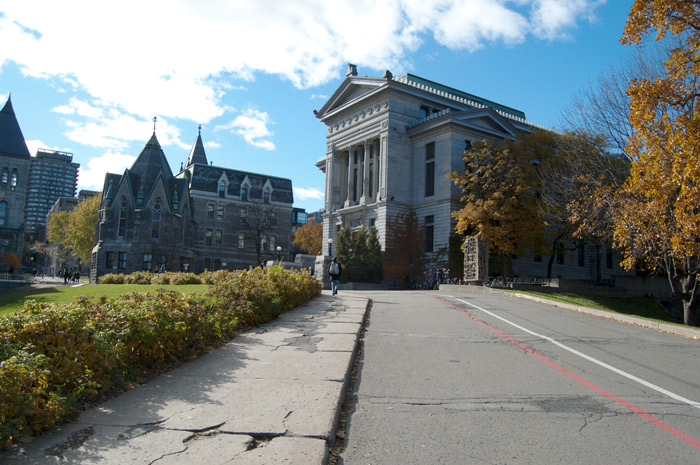On Sept. 13, McGill’s Media Relations Office hosted a roundtable interview for student media with Celeste Pedri-Spade, the university’s first Associate Provost for Indigenous Initiatives and an Associate Professor of Anthropology.
Pedri-Spade, who began her five-year appointment in September 2022, is an Anishinaabekwe (Ojibwe) and a member of the Lac des Mille Lacs First Nation in northwestern Ontario. During the roundtable, she spoke about the university’s progress in carrying out the 52 calls to action outlined in the 2017 final report of the Provost’s Taskforce on Indigenous Studies and Indigenous Education, the implementation of which she is responsible for supervising through the Office of Indigenous Initiatives (OII).
The OII serves as a “central administrative site” to oversee Indigenous initiatives at the university. The office’s role is to help aid in rendering the university community safe, welcoming, and inclusive for Indigenous people. She stressed that, despite the existence of the OII, all sectors of the university must actively work toward outreach and collaboration with Indigenous communities.
“I think everybody should be doing Indigenous community engagement, right? It’s not just the Office of Indigenous Initiatives. We can help, and we do [provide] support,” Pedri-Spade said.
As of the Fall 2022 census, 257 students—1.1 per cent of the total student population—self-identified as Indigenous. As of February 2022, there were 31 Indigenous faculty and staff members.
Pedri-Spade emphasized the importance of hiring Indigenous people at the university and pointed to the success the OII has had in recruiting more Indigenous staff and faculty over the past few years.
“I think one of the things that is really key […] is recruiting First Nations, Inuit, and Métis scholars, who then bring those perspectives,” Pedri-Spade said. “They not only speak from their nationhood, but they speak from their lived experience and positionality.”
She stated that 15 Indigenous faculty and staff joined McGill last year and that another 10 will be welcomed at a ceremony in October—all of whom are teaching Indigenous courses.
When asked about McGill’s work on Indigenous issues, Students’ Society of McGill University (SSMU) vice-president of University Affairs Lalia Katchelewa expressed that progress on the 52 calls to action has sometimes felt slow. Despite this, she showed optimism about the OII’s future.
“I am looking forward to seeing the university’s progress on the 52 calls to action under this new administration,” Katchelewa wrote to The Tribune. “It seems there was a lack of momentum in the past few years on a few of these initiatives.”
Pedri-Spade also spoke to the financial and community support that the OII provides to decrease barriers to access and encourage more Indigenous individuals to come to the university. She touched on the importance of working closely with the Indigenous community at McGill to determine what needs exist and how they can be met.
“One of the things that we’re really excited about is that we’ve been working for a year doing a needs assessment with our Indigenous students,” Pedri-Spade said. “That has now culminated into a position that is about to be posted, where we have an actual dedicated, Indigenous students’ mental health counselor within the First Peoples’ House.”
Thomasina Phillips, current Associate Director of Indigenous Student Success and former First Peoples’ House manager, wrote about the importance of First Peoples’ House as a resource for McGill’s Indigenous community in a statement for The Tribune.
“Some of the initiatives coordinated by [First Peoples’ House] include orientation workshops and information sessions, cultural and arts-based group activities such as beading, moccasin-making and drumming,” Phillips wrote by email. “Through [First Peoples’ House], students have access to personal support with Elders on a bi-weekly basis and academic and practical supports like subsidized tutoring, writing support, free printing, study space, and free snacks.”
Leah Louttit-Bunker, who is co-chair of the Indigenous Student Alliance, stressed the key role that First Peoples’ House has played throughout her university experience in a statement to The Tribune.
“The First Peoples’ House was and still is my home away from home after studying at McGill for three years now, it is an incredibly supportive space where Indigenous students can make friends and connect with our cultures,” Louttit-Bunker wrote.
Pedri-Spade and Louttit-Bunker both encouraged students to attend McGill’s 2023 Indigenous Awareness Weeks, which are put on by First Peoples’ House and the OII and take place from Sept. 18 to Sept. 30.









